Daily Vocabulary Words: List of Daily Used Words
Hi there. Welcome to this special section @ Wordpandit.
Our endeavour here is straightforward: highlighting important daily vocabulary words, you would encounter in The Hindu. This is your repository of commonly used words; essentially, we are posting a list of daily used words. Hence, this has significant practical application as it teaches you words that are commonly used in a leading publication such as The Hindu.
Visit the website daily to learn words from The Hindu.
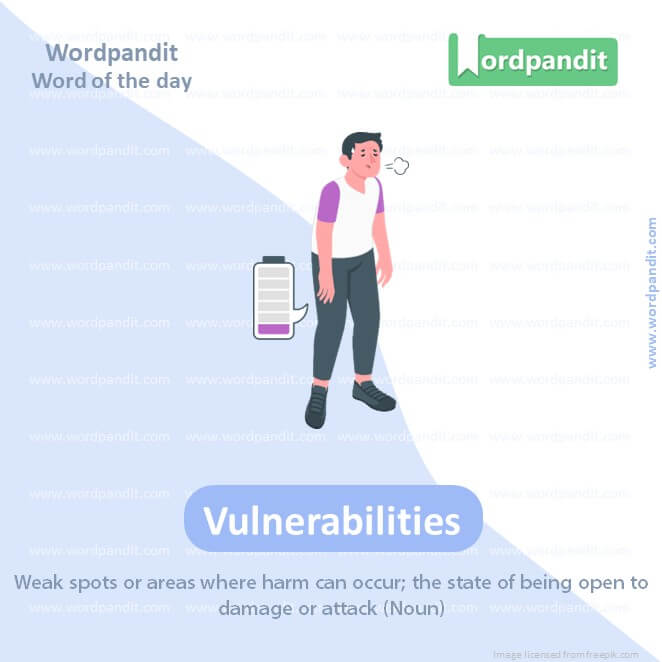
WORD-1: Vulnerabilities
CONTEXT: Disability as an identity and entity exists at the intersection of multiple vulnerabilities — social, economic and gender — with each facet requiring careful consideration when conceptualising action for equity.
SOURCE: The Hindu
EXPLANATORY PARAGRAPH: “Vulnerabilities” are like the weak spots on a superhero’s shield where it can get easily damaged. It’s when someone or something can be easily hurt or harmed in some way.
MEANING: Weak spots or areas where harm can occur; the state of being open to damage or attack (Noun).
PRONUNCIATION: vul-ner-uh-BIL-i-tees
SYNONYMS: Weaknesses, Flaws, Susceptibilities, Risks, Frailties, Deficiencies, Liabilities
USAGE EXAMPLE:
1. The security system has several vulnerabilities.
2. They discussed the vulnerabilities in their plan.
3. To protect the network, it’s important to understand its vulnerabilities.
4. The counselor helped him understand his emotional vulnerabilities.
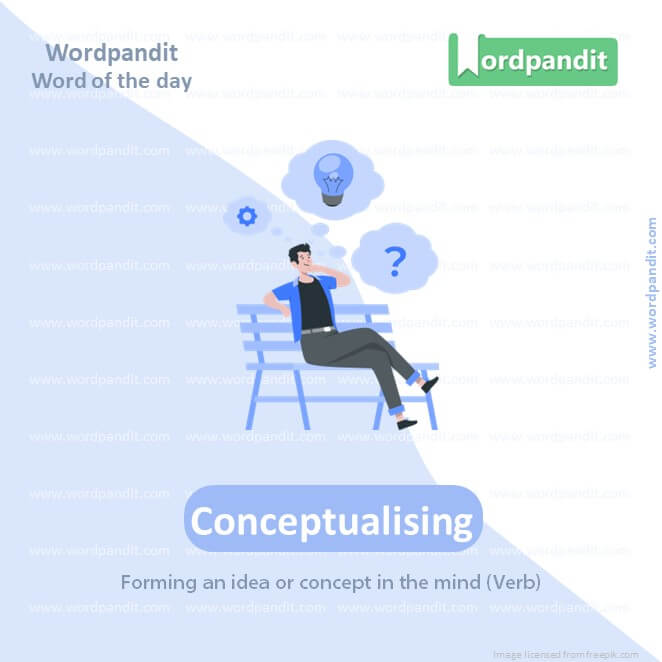
WORD-2: Conceptualising
CONTEXT: Disability as an identity and entity exists at the intersection of multiple vulnerabilities — social, economic and gender — with each facet requiring careful consideration when conceptualising action for equity.
SOURCE: The Hindu
EXPLANATORY PARAGRAPH: “Conceptualising” is like using your imagination to think of a brand-new toy. It’s when you make an idea in your mind about something.
MEANING: Forming an idea or concept in the mind (Verb).
PRONUNCIATION: kun-SEP-choo-uh-lye-zing
SYNONYMS: Imagining, Envisioning, Theorizing, Formulating, Ideating, Picturing, Dreaming up
USAGE EXAMPLE:
1. She’s good at conceptualising new projects.
2. The artist spent time conceptualising his next work.
3. Conceptualising a solution took the team several weeks.
4. We are in the stage of conceptualising our marketing strategy.
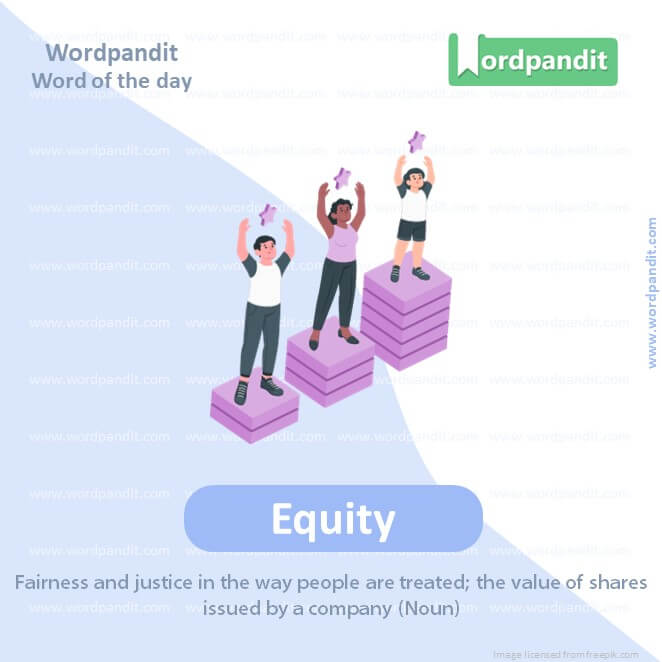
WORD-3: Equity
CONTEXT: Disability as an identity and entity exists at the intersection of multiple vulnerabilities — social, economic and gender — with each facet requiring careful consideration when conceptualising action for equity.
SOURCE: The Hindu
EXPLANATORY PARAGRAPH: “Equity” is like making sure everyone gets a fair share of the cookies. It’s about being fair and giving people what they need to have the same opportunities.
MEANING: Fairness and justice in the way people are treated; the value of shares issued by a company (Noun).
PRONUNCIATION: EK-wi-tee
SYNONYMS: Fairness, Justice, Impartiality, Equality, Fair-mindedness, Value, Worth
USAGE EXAMPLE:
1. The new policy was designed to promote equity in schools.
2. He has significant equity in the company.
3. Equity in healthcare is a major goal.
4. She’s concerned about equity in the workplace.
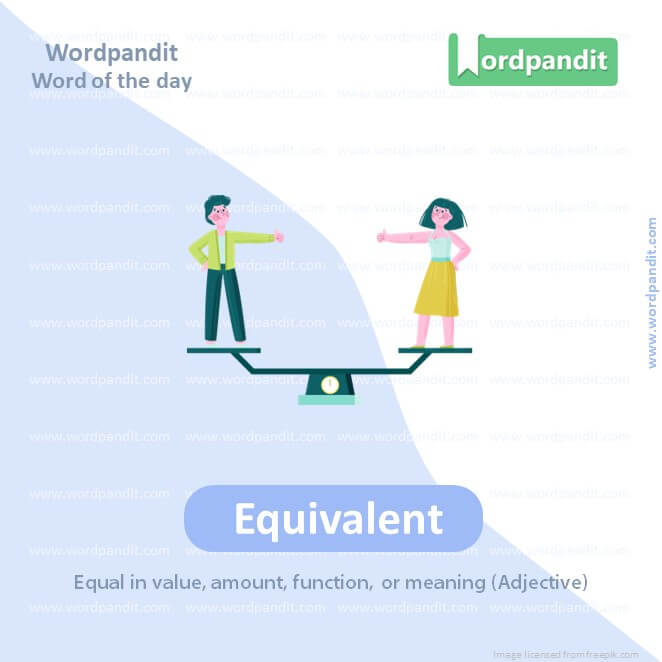
WORD-4: Equivalent
CONTEXT: Globally, 1.3 billion people (which is equivalent to nearly the entire population of India) live with some form of disability. Of them, 80% live in developing countries; further, 70% of them live in rural areas. Current systems are designed for persons without disabilities and end up being exclusionary to people with disabilities, resulting in them experiencing higher instances of poverty, lack of access to education and opportunities, informality and other forms of social and economic discrimination.
SOURCE: The Hindu
EXPLANATORY PARAGRAPH: “Equivalent” is like having two different toy cars that are the same size and speed. It’s when one thing is almost the same as another thing in value, amount, or meaning.
MEANING: Equal in value, amount, function, or meaning (Adjective).
PRONUNCIATION: ih-KWIV-uh-luhnt
SYNONYMS: Equal, Comparable, Similar, Alike, Identical, Corresponding, Commensurate
USAGE EXAMPLE:
1. Four quarters are equivalent to one dollar.
2. The word has no equivalent in other languages.
3. His job is the equivalent of a manager.
4. They had to find an equivalent solution.
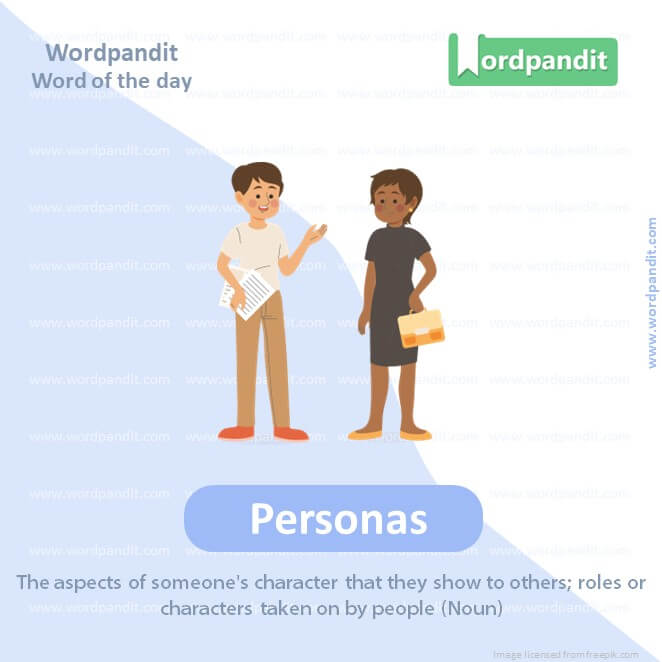
WORD-5: Personas
CONTEXT: Globally, 1.3 billion people (which is equivalent to nearly the entire population of India) live with some form of disability. Of them, 80% live in developing countries; further, 70% of them live in rural areas. Current systems are designed for persons without disabilities and end up being exclusionary to people with disabilities, resulting in them experiencing higher instances of poverty, lack of access to education and opportunities, informality and other forms of social and economic discrimination.
SOURCE: The Hindu
EXPLANATORY PARAGRAPH: “Personas” are like when you pretend to be a brave knight or a wise wizard. It’s like a character or role that someone acts like in different situations.
MEANING: The aspects of someone’s character that they show to others; roles or characters taken on by people (Noun).
PRONUNCIATION: per-SOH-nahs
SYNONYMS: Characters, Roles, Images, Identities, Masks, Profiles, Guises
USAGE EXAMPLE:
1. The actor adopted different personas for each role.
2. She has a very friendly persona at work.
3. Marketing teams create personas to understand their customers.
4. His online persona is quite different from his real-life self.
WORD-6: Poverty
CONTEXT: Globally, 1.3 billion people (which is equivalent to nearly the entire population of India) live with some form of disability. Of them, 80% live in developing countries; further, 70% of them live in rural areas. Current systems are designed for persons without disabilities and end up being exclusionary to people with disabilities, resulting in them experiencing higher instances of poverty, lack of access to education and opportunities, informality and other forms of social and economic discrimination.
SOURCE: The Hindu
EXPLANATORY PARAGRAPH: “Poverty” is when people don’t have enough money to buy things they need like food, clothes, or a place to live. It’s like not having enough blocks to build a house.
MEANING: The state of being extremely poor; having very little money or resources (Noun).
PRONUNCIATION: POV-er-tee
SYNONYMS: Deprivation, Destitution, Hardship, Impoverishment, Need, Penury, Lack
USAGE EXAMPLE:
1. Many organizations work to reduce poverty.
2. Poverty affects millions of people around the world.
3. The government introduced measures to fight poverty.
4. Growing up in poverty can be very challenging.
WORD-7: Discrimination
CONTEXT: Globally, 1.3 billion people (which is equivalent to nearly the entire population of India) live with some form of disability. Of them, 80% live in developing countries; further, 70% of them live in rural areas. Current systems are designed for persons without disabilities and end up being exclusionary to people with disabilities, resulting in them experiencing higher instances of poverty, lack of access to education and opportunities, informality and other forms of social and economic discrimination.
SOURCE: The Hindu
EXPLANATORY PARAGRAPH: “Discrimination” is like choosing to play only with certain toys and not others, even when they’re all nice. It’s treating people unfairly because they’re different in some way.
MEANING: Unjust treatment of different categories of people, especially on the grounds of race, age, or gender (Noun).
PRONUNCIATION: dis-krim-uh-NAY-shuhn
SYNONYMS: Prejudice, Bias, Injustice, Partiality, Bigotry, Favoritism, Unfairness
USAGE EXAMPLE:
1. Laws exist to protect against discrimination at work.
2. Discrimination based on gender is illegal.
3. They are campaigning to end racial discrimination.
4. The policy was criticized for discrimination against certain groups.
WORD-8: Inclusion
CONTEXT: According to the English dictionary, “For” is often used when a person is receiving something and “By” is to “identify the agent performing an action”. This difference is crucial when it comes to disability inclusion, as the approach is completely different if it is “by” persons with disabilities being a part of the process and not “for” them, without them in the process.
SOURCE: The Hindu
EXPLANATORY PARAGRAPH: “Inclusion” is like inviting everyone in your class to your birthday party, so no one feels left out. It’s making sure everyone is included and treated as an important part of a group.
MEANING: The act of including everyone and making them feel welcome; being a part of a group or structure (Noun).
PRONUNCIATION: in-KLOO-zhuhn
SYNONYMS: Incorporation, Integration, Involvement, Participation, Embracement, Inclusion, Absorption
USAGE EXAMPLE:
1. The school promotes inclusion in all activities.
2. Inclusion in the workplace is important for diversity.
3. The project aims at the inclusion of marginalized communities.
4. Her book discusses strategies for better social inclusion.
WORD-9: Outset
CONTEXT: At the outset, the inclusion of persons with disabilities into the economy can help boost global GDP between 3% to 7%, as per the study by the International Labour Organization (ILO), “The price of exclusion: The economic consequences of excluding people with disabilities from the world of work”.
SOURCE: The Hindu
EXPLANATORY PARAGRAPH: “Outset” is like when you first start building a Lego castle. It’s the very beginning of something, like a story or a project.
MEANING: The start or beginning of something (Noun).
PRONUNCIATION: OUT-set
SYNONYMS: Start, Beginning, Commencement, Inception, Launch, Initiation, Onset
USAGE EXAMPLE:
1. He was involved in the project from the outset.
2. At the outset of the journey, everyone was excited.
3. The plan was clear from the outset.
4. Difficulties were encountered at the very outset.
WORD-10: Exclusion
CONTEXT: At the outset, the inclusion of persons with disabilities into the economy can help boost global GDP between 3% to 7%, as per the study by the International Labour Organization (ILO), “The price of exclusion: The economic consequences of excluding people with disabilities from the world of work”.
SOURCE: The Hindu
EXPLANATORY PARAGRAPH: “Exclusion” is like when someone is not allowed to join in a game with others. It’s leaving someone out of a group or activity on purpose.
MEANING: The act of not allowing someone to participate in something; leaving out or barring someone (Noun).
PRONUNCIATION: ek-SKLOO-zhuhn
SYNONYMS: Omission, Rejection, Banishment, Elimination, Prohibition, Debarment, Disqualification
USAGE EXAMPLE:
1. The exclusion of certain foods can lead to deficiencies.
2. Her exclusion from the team was controversial.
3. The policy led to the exclusion of many applicants.
4. The club faced criticism for its exclusion practices.
Vocabulary new Words
In the exuberant realm of language learning, nothing holds more thrill than the discovery of ‘vocabulary new words’. These gems of knowledge bring with them a fresh perspective and a deeper understanding of language. However, learning ‘vocabulary new words’ requires a methodical and focused approach.
The act of learning ‘vocabulary new words’ is a delve into linguistic novelty, often involving exposure to unfamiliar structures and meanings. Transcending the traditional approach of mere memorization helps in truly cementing newly learnt words into long-term memory. Interaction with a broad spectrum of written and spoken material, including novels, films, podcasts, and digital resources, provides a rich context of ‘vocabulary new words’ and significantly aids in their comprehension.
It’s noteworthy that unpacking ‘vocabulary new words’ is a steady process rather than a rushed one. A planned approach with a specific number of words, learned and reviewed each day, proves beneficial in effective learning. Coupling this method with technologies such as flashcards or memory-enhancement software can optimize the retention of ‘vocabulary new words’.
Integrating mnemonic devices and visual imagery is another highly efficient tool when learning ‘vocabulary new words’. Assigning unique stories or visuals to new words can enhance recall, making unfamiliar vocabulary much more approachable.
Lastly, practicing ‘vocabulary new words’ within daily routine is crucial for grasping their usage. Whether it’s through active utilization in conversation or incorporating these words in written communicative situations, application reinforces understanding.
In summation, mastering ‘vocabulary new words’ is an enriching pursuit that expands our linguistic horizons. However, a balanced approach, combining diverse reading materials, pacing your learning, employing memory-boosting strategies, and daily practice greatly streamlines the task. Embark on this fascinating journey, and let the ‘vocabulary new words’ fill your linguistic canvas with a fresh palette of expressions.













